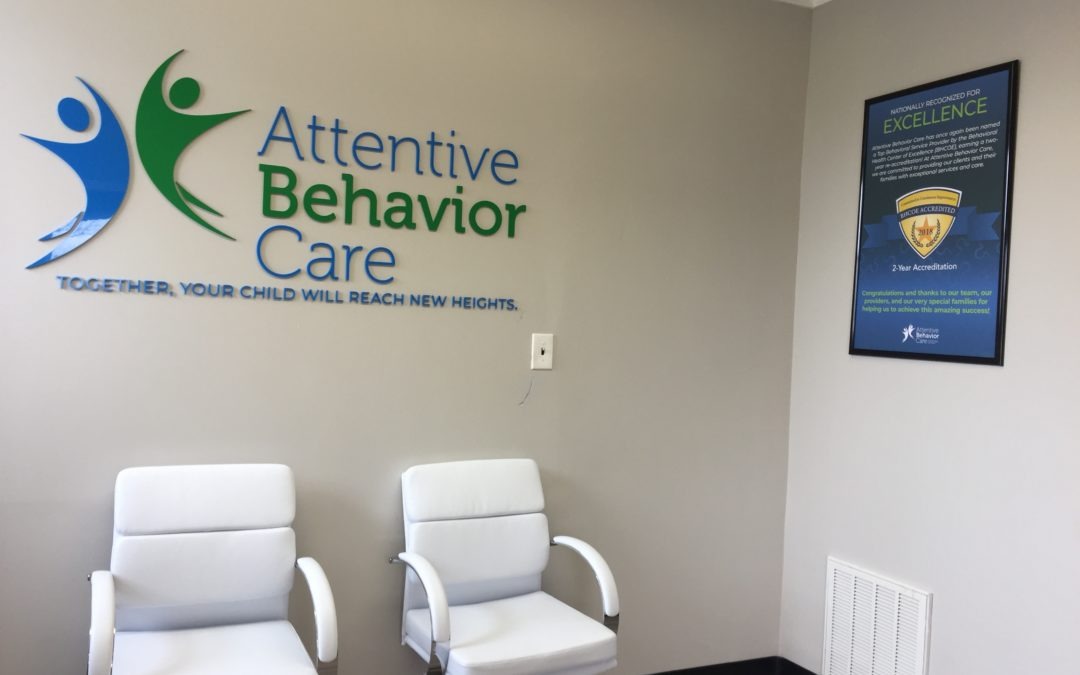
by admin | Apr 29, 2019 | ABA Therapy, Parent
By: Paige Sands BS, ABA Graduate Student, and Maria Pantelides, MA, BCBA, LBA (CT, MA, MD, NY)
Caregivers have one of the hardest jobs in the world. Whether you are a parent, grandparent, aunt, uncle or other form of primary caregiver, you know how big of a responsibility it is to be in charge a little life twenty-four seven.
When your child has special needs, additional challenges can arise. It’s around this time that you may begin to look for outside support. This is an important first step! So, you find an agency and begin your ABA journey. Your family has been assigned a BCBA® and supporting technicians…now what?
Your team will work to get your child on the right path, but we cannot do it alone! ABA therapy requires a team effort. We are only one link in the chain. In order for what we bring to the table to stick, we need caregiver support. BCBA’s® and technicians need parents to be part of their child’s treatment during every step of the process so results can have maximum impact.
Why Be Involved?
Your provider will be working very hard on their programming to ensure your child is able to apply skills learned, which can be translated across multiple environments and people. As your child begins to approach mastery criteria with their technicians, your treatment team will start to move toward handing the new skill or behavior reduction techniques off to you as a caregiver.
This can really happen during almost any point in the process, but most of the time occurs once your child is used to the expectation. Caregiver training allows you to spend time learning how your technician has been approaching teaching your child to set you both up for long-term success. Bennett (2012) outlines that when caregivers are not involved, then a disconnect between treatment and everyday life can occur making it more difficult for skills to generalize.
How Can You Be Involved?
It is one thing for us to say we want you to be an involved caregiver, however you may be thinking; “How do I do that?”
The easiest and quickest answer is to be willing to participate in caregiver training, but there is a lot you can do. Communication with your treatment team is huge. If you notice changes in your child’s behavior when the treatment team is not around or if a previous learned skill is not being shown, tell your team. Your team will work with you to find what may be contributing to this. Additionally, if there is a specific skill you want worked on, let your BCBA® know and they will work with you to add it to your child’s goals.
Long Term Benefits
Look at ABA therapy as an investment. It’s an investment for your child and for yourself. The goal for your provider is to teach themselves out of your need for them, to give you control back. Grindle et al (2009) showed that 86% of female caregivers and 52% percent of male caregivers saw practical benefits for themselves after introducing ABA into their lives.
More importantly, both parties saw 100% improvement in their child. Other research shows that “parental involvement is the one invariable factor and an integral part of the success of early intervention programs for children with autism” (Ozonoff & Cathcart, 1998). Take the time, make the investment and be an active part of your child’s success in ABA!
References:
- Bennett, A. (2012) “Parental Involvement in Early Intervention Programs for Children with
Autism” Master of Social Work Clinical Research Papers.
- Grindle, C., Kovshoff, H., Hastings, R., & Remington, B. (2009). Parents’ experiences of home-based applied behavior analysis programs for young children with autism. Journal of Autism and Developmental Disorders, 39(1), 42-56. doi:10.1007/s10803-008-0597-z.
- Ozonoff, S., & Cathcart, K. (1998). Effectiveness of a home program Intervention for young children with autism. Journal of Autism and Developmental Disorders, (1), 25-32.
For more information about Attentive Behavior Care and how we can help your child, please contact us today.

by admin | Apr 18, 2019 | ABA Therapy, Clinician's Corner, Provider
By: Jessica Basir, M.S., BCBA, LBA (NY, CT)
If you are reading this post, chances are you are pursuing an ABA therapy job. You may have a lot of experience working in the field, or you even have your BCBA®. Maybe you are just beginning your journey in this field and have no experience at all. Either way, deciding on a job in the field of ABA therapy can be overwhelming since there are a multitude of options out there.
So, how do you choose?
You already made the first step by checking out our website and doing some research!
First and foremost, many individuals who work for Attentive Behavior Care (ABC) grew their careers within the company. Current full-time BCBA’s® began their careers working part-time with ABC as technicians on one or two cases.
As their interest grew in the field, they began pursuing their education in ABA, obtaining their degrees, and becoming Board Certified Behavior Analysts®. From there, they pursued their career goals with the help of the clinical team and obtained full-time positions as supervisors overseeing a multitude of cases. ABC helps grow professionals and fosters long-term professional goals.
Working at ABC
ABC has been recognized as a Behavioral Health Center of Excellence since 2016 and was recently awarded a two-year re-accreditation from the BHCOE. This award recognizes the company’s integrity and the effectiveness of the services they provide. Working for a company that achieves substantial recognition in our field provides a great sense of pride and admiration from the employees who work within it. At ABC, you can be proud of where you work.
Working within ABC you will also have access to top-of-the-line data collection systems and virtual clinics. Rather than completing data on paper, fussing with clipboards, and managing a multitude of program sheets, all data is stored in a virtual database allowing for easy access of all programs, targets, and data collection procedures. You do not have to worry about forgetting anything because it is all at your fingertips! ABC also provides all staff with their own personal company tablets, and an on-site training team to assist with any difficulties you may have.
ABC’s Support Teams
Another great asset of ABC is their support teams. Whether you are a technician starting your first case, or a BCBA® who has been in the field for years, the science of ABA therapy requires an extensive amount of collaboration. ABC provides each case with a case coordinator, an individual assigned to help maintain schedules, consents, and communication between families and their staff. In addition to the coordination staff, the offices consist of a clinical director who is assigned to help collaborate and respond to clinical questions concerning your specific cases.
ABC also offers part-time and full-time opportunities, in multiple states. Schedules are tailored to your preference in location, times, and skill level. Similarly, the company fosters an environment that allows individuals to grow and pursue their long-term career goals from start to finish.
Whether you are just beginning your journey or are a seasoned professional in the field of ABA therapy, ABC will support you on your journey to growing your skills and offer you experiences that will last a lifetime.
That is why I love working at ABC!
Are you interested in joining the Attentive Behavior Care team? Apply today!

by admin | Apr 11, 2019 | ABA Therapy, Company News, Interviews
This interview first appeared in the Voice of Lakewood on November 22, 2018.
Q: Tell us About Attentive Behavior Care.
A: We provide ABA therapy for individuals on the autism spectrum; we work with children aged 18 months and up and adults. ABA is a science-based method that has been proven to work in addressing the core deficits of autistic children: social, communication, and behavior reduction. Because autism is a spectrum disorder, a wide range of children fall along the spectrum. Some are nonverbal and need to learn how to communicate their needs, while others need social skills training and group practice to bring them up to par. Examples of skills that we target include social skills, toilet training, independent dressing, safety skills, communication, and hygiene — all essential skills which enhance the quality of life of the child.
At Attentive Behavior Care, we believe in a team approach; we work closely with parents, professionals, and other peers to ensure that skills learned are being maintained in the child’s natural environment. I frequently tell parents, “If your child only behaves while with me in my office, I was not successful.”
Q: Please share some thoughts about your clients.
A: There is a saying, “When you meet one child with autism, you have met one child with autism.” Each autistic child has individual needs, and I see each child as a puzzle with unique strengths and weaknesses. Our job is to figure out what is causing their behaviors, which skills are lacking, and what motivates them to learn new skills. Then, we work to build additional skills in a fun and meaningful way.
Q: Why did you choose ABA Therapy as a career?
A: I have worked in this field for almost 11 years. I’ve always enjoyed children and teaching, and even spent a number of years fostering autistic children. Working with these children really intrigued me. Some don’t have obvious disabilities, but something is holding them back from progressing academically and socially. It pained me to watch them suffer, and I wanted to help them and teach them to advocate for themselves and better fit in with their peers. I had a master’s degree in special education, and I began taking courses in Applied Behavior Analysis, eventually becoming a certified BCBA®. It’s not easy to teach social skills and communication to children who don’t pick them up naturally, but I was, and am, driven to help these children. Now, as a BCBA®, I always keep up-to-date on the newest research. My motto is “The more I know, the more I will be able to help children.”
Q: Tell us about some memorable experiences.
A: I once worked with a nonverbal two-year-old whose mother was told her son would never speak. Of course, she was devastated. At the initial assessment, he made noises, but didn’t actually form any words; he cried and used aggression to have his needs met. After around three weeks, he was able to say “pizza,” his favorite food. His mother called everyone to share her excitement… and a year later this boy is speaking in full sentences! The most satisfying type of phone call I receive is when a child cancels their social group because they were invited to a play-date with a friend instead. Then I know we have accomplished our goal.
Q: What is unique about Attentive Behavior Care?
A: It’s easy to teach a skill; it’s harder for children to apply the skills in real life situations. At Attentive Behavior Care, we plan for generalization in two ways: Number one, we involve the parents in the therapy; by giving parents hands-on training, we enable them to achieve success with their child at home. We also offer great social groups, or “clubs,” where the child practices their skills in a natural environment, with the therapist present. Children bake, play sports, create crafts, or play games in order to practice skills such as conversation, reading social cues and gestures, losing a game gracefully, problem-solving, following directions, compromising, adjusting to changes in routine, sharing, and taking turns.
We also have a special program that we all our “Attentive Day Center.” We have our own classrooms and play areas, and we provide a full-day therapy program for preschool-aged children, focusing on communication, play, and social and independent skills. Recently, we have expanded our services in these Day Centers to include Speech-Language Pathology (SLP) and Occupational Therapy (OT). This allows the children to receive an intense therapy focused on skill-building in a fun and engaging way at this critical time in their lives – all under one roof!
Q: What do you tell a parent who’s child needs therapy?
A: Early intervention is always the key. Sometimes parents are hopeful that their child’s symptoms will lessen and they will “catch up” to their peers. Unfortunately, many times the gap only widens, and we then have to make up for lost time. It is also important for the therapy to take place where the issues are happening. If a child misbehaves at home, the therapy should take place at home as well. Having a child with special needs is difficult. These suggestions can help:
Having a child with special needs is difficult. These suggestions can help:
- Have clear expectations and rules. These children often have “black and white” thinking and have trouble understanding words like “later,” “we’ll see,” and “maybe.”
- Focus on the good; praise your child as much as possible.
- Spend a few minutes of quality time with your child daily, with no interruptions.
Q: How can a parent ensure that they get the most out of therapy?
A: Parents need to be open about their child’s struggles; understanding all the dynamics in your child’s life will allow us to provide much more effective help. Remember, we are here to help, not to judge. When I come to people’s homes at busy times, I tell them, “We all have families of our own. We don’t expect a clean or perfectly calm house.”
If you would like more information on how Attentive Behavior Care can help your child, contact us today!

by admin | Apr 4, 2019 | Clinician's Corner, Provider
By: Nahoma Presberg, MS BCBA
If you are interested in practicing behavior analysis in New York State, you might have started to look at what credentials are required to practice in different environments.
The Behavior Analyst Certification Board® (BACB®) is the national governing board which is in charge of the BCBA® credential. If you are a Board Certified Behavior Analysit (BCBA®), you have completed the coursework and practicum and passed the examination administered by the BACB®.
In some states, this is enough to practice behavior analysis. However, New York State does not recognize the BACB® credential. Instead, there is a licensure process. While the BCBA® credential is technically not required in New York State, it is highly recommended that behavior analysts also earn this credential since it is the gold standard in the field.
The New York State license requires that you:
- Have a master’s degree from a program registered by the Department or determined by the Department to be substantially equivalent to such a program, in accordance with the Commissioner’s Regulations
- Complete 1,500 supervised hours with individuals with ASD in the practice of applied behavior analysis satisfactory to the Board and Department in accordance with the Commissioner’s Regulations
- Pass the Examination (this is the same that you’d take to obtain your BCBA®)
- Pass the New York State Autism Exam
There are two ways to obtain your New York State LBA (Licensed Behavior Analyst). Some people choose to get their LBA at the same time as they are working on their BCBA®. This can be done through a University masters program. Others choose to get their BCBA® prior to their LBA. In this situation, you would qualify to apply for a limited permit in New York State. The limited permit allows you to work as a behavior analyst for a year under the supervision of a licensed behavior analyst. Many people finish their requirements for the license under their limited permit.
Obtaining a Limited Permit
First, let’s talk about how to apply for and obtain a limited permit.
The first step is to submit the Application for Licensure, which is Form 1 on the New York State Office of the Professions website. Whether you are applying directly for your license or first applying for the limited permit, you will only need to submit this form once. It opens up your general application. With this form, you will submit the $300 application fee (also only paid once), and an additional $70 limited permit application fee.
The next step is to submit Form 2. This is the certificate of professional education. Some programs are licensed accredited institutions, which means that New York State has pre-approved the coursework, so getting your education approved should be a simple process. However, if you did not graduate from a pre-approved site, you can still demonstrate that your education meets the state requirements.
The next step for the limited permit is Form 5. This is the application for the limited permit itself. In order to receive a limited permit in New York State, you must have someone who is willing to be your supervisor. They will have to fill out the form with you, demonstrating to the state that you will have the appropriate supervision during the limited permit process.
It is highly recommended that once your limited permit gets approved, you finish your hours within a year because that is when the limited permit expires. If you are unable to finish the required hours within a year, you can reapply for the limited permit in order to complete this process.
Obtaining Supervision
If you are practicing with a limited permit in New York State, you are required to meet for 2 hours a week with your supervisor. These meetings can occur directly in sessions with patients or as meetings outside of a formal session. These meetings must occur face-to-face, but can be in person or via a webcam or virtual meeting space.
Applying for Licensure
At this point, you are ready to apply for licensure. Either you have completed your 1,500 hours at the same time as obtaining your BCBA® or you have completed your hours as a limited permit practitioner. Either way, you are ready to submit Form 4.
Form 4 is the Report of Professional Experience. This is the form that your supervisor signs to attest to the hours you have completed doing behavior analytic work with individuals with Autism.
Obtaining your license to practice behavior analysis in New York State can be a stressful and confusing process. This article attempts to outline the basic process of what you might encounter, but depending on your specific situation and background, there may be differences that you experience. Make sure to be thorough in your communication and documentation.
As a clinician who is in the process of obtaining an LBA, the strong recommendation is to call the Office of the Professions on a regular basis. They are often extremely busy with applications and it can take a long time for them to process paperwork.
However, if you call them regularly, they can give you more accurate updates about your process and let you know if you are missing any forms of documentation that you may have missed. Often times it can take many weeks or months to get any piece of the process completed. You should also expect long wait times in order to speak to a representative.
I wish everyone good luck with the process and a smooth transition to becoming a licensed clinician!
Please note: This post was written by a BCBA® familiar with the NY State LBA process based on personal experience. It is designed to provide insights based on this experience that may prove helpful to others seeking their NYS LBA. It does not constitute legal advice.
Additional information can be found on the website: http://www.op.nysed.gov/prof/aba/abalic.htm.
Are you interested in joining the Attentive Behavior Care team? Apply today!




